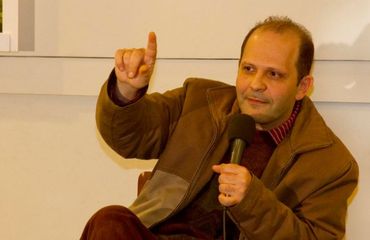São Paulo – Hanna Diab was a Syrian Maronite who lived in the 18th century. It was he who narrated some of the best-known tales in the Book of One Thousand and One Nights to France’s Antoine Galland, who made the first Western translation of the stories told by Scheherazade. A few stories of Diab’s own travels will be discussed on the 25th this month at a meeting with Mamede Jarouche, an Arabic Literature professor at the University of São Paulo (USP). The event will take place in the city of São Paulo.
The debate is part of the cycle O Estranho e o Estrangeiro (literally The Strange One and the Stranger), hosted by Cátedra Edward Saïd: Estudos da Contemporaneidade (the Edward Said Chair: Studies on Contemporaneity), a partnership between the Federal University of São Paulo (Unifesp) and the Institute of Arab Culture (Icarabe). Jarouche made the full translation of the One Thousand and One Nights directly from Arabic into Portuguese.
The travel stories concern Diab’s trip from Syria to Europe and back, in 1707. According to Jarouche, the document containing the stories, written in dialectal Arabic, was taken in the 19th century to the Vatican Apostolic Library by a Syrian priest who collected stories from Christians. According to the USP professor, the papers were found by a researcher in the 1970s.
The stories Diab told Galland include Aladdin’s and Ali Baba’s. “He was a natural-born storyteller. No wonder the stories turned out so successful,” Jarouche remarks. “I have told you stories that I knew, not stories that I made up,” Diab allegedly said to Galland, Jarouche quotes the Frenchman as saying.
Without Galland’s documentation, which he committed to paper in the early 1700s, those famous stories would probably have been lost. “Those stories did not survive in writing, not even in the Arab world,” says Jarouche, noting that these were tales from oral tradition, that is, they were passed on through word-of-mouth and weren’t written down anywhere.
Although Diab’s trip took place in 1707, his account wasn’t written until 1760. “It’s what we might call an impressionistic account,” says Jarouche, explaining that the document conveys the Syrian’s impressions of his journey, and that there is some degree of imprecision when it comes to dates.
Jarouche tells that Diab was about to become a priest, but eventually gave up. “He went to a monastery in Lebanon, but didn’t go through with his option for monastic living. Back in Aleppo, he met a diplomat who invited him to go to France,” Jarouche recounts.
Questioned whether the accounts contain facts that may have influenced the stories in the Book of One Thousand and One Nights, the USP professor says no, but notes that Diab was a religious man who believed in fantastic things.
There are no plans of translating the document into Portuguese. Currently, Jarouche and Safa Jubran, an Arabic professor at USP, are working on an Arabic edition of the original document.
Professor Jarouche’s lecture is one of several talks on Middle East studies scheduled for this year under the Unifesp-Icarabe partnership. In March, Olgária Matos presented the thinking of Algeria’s Jacques Derrida.
Debate Cycle – "History of Another East: the travels of the narrator of Aladdin and Ali Baba” – Edward Said Chair
April 25th, from 5pm to 7pm
Where: Leitão da Cunha Amphitheater (Unifesp) – Rua Botucatu, 720 – Vila Clementino, São Paulo/SP
Registration available at http://migre.me/tvFkU
Free admission
*Translated by Gabriel Pomerancblum




